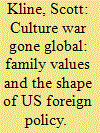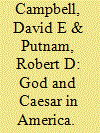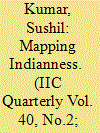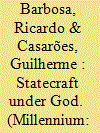|
|
|
Sort Order |
|
|
|
Items / Page
|
|
|
|
|
|
|
| Srl | Item |
| 1 |
ID:
058827


|
|
|
| 2 |
ID:
138994


|
|
|
|
|
| Summary/Abstract |
1968 IS BACK. A growing chorus of voices on the right is arguing that the riots in Baltimore and Ferguson are ushering in a new round of the culture wars. On the website Breitbart, for example, Robert W. Patterson, a former George W. Bush administration official, wrote, “The Grand Old Party must decide: Go libertarian, and sympathize with the protesters and rioters? Or does it want to be conservative, and side with the police, the rule of law, and the forces of order? The lessons of the 1960s suggest the latter is the path to victory.” William Kristol, editor of the neoconservative Weekly Standard, observed during the recent riots in Ferguson, “It does feel like a Nixon ’68 moment. Who will speak for the Silent Majority?
|
|
|
|
|
|
|
|
|
|
|
|
|
|
|
|
| 3 |
ID:
110922


|
|
|
|
|
| Publication |
2012.
|
| Summary/Abstract |
A Feb. 29 update to the print story from the March/April issue: In the wake of the Great Recession it would seem natural that the 2012 election would be fought over economic issues. Yet so far in the Republican primaries, we have seen social issues, and religion especially, move to the forefront. Rick Santorum is only the latest in a series of Republicans who have infused their campaigns with talk about God. Even Mitt Romney, a Mormon who has generally tried to avoid discussing religion, has recently pledged to defend "religious liberty" against the Obama administration. Increasingly, the rhetoric of the leading Republican contenders echoes the Republican fringe of twenty years ago. Then, we heard Pat Buchanan -- the quintessential protest candidate -- bombastically declare that America was in the midst of a culture war. Today, the frontrunners all play to the Republican base by describing the White House's "war on religion."
|
|
|
|
|
|
|
|
|
|
|
|
|
|
|
|
| 4 |
ID:
128556


|
|
|
| 5 |
ID:
153770


|
|
|
|
|
| Summary/Abstract |
Party-driven and religion-driven models of opinion change posit that individuals revise their positions on culture war issues to ensure consonance with political and religious predispositions. By contrast, models of issue-driven change propose that public opinion on cultural controversies lead people to revise their partisan and religious orientations. Using data from four panel studies covering the period 1992–2012, we pit the party- and religion-based theories of opinion change against the issue-based model of change. Consistent with the standard view, party and religion constrain culture war opinion. Contrary to the conventional wisdom, but consistent with our novel theory, opinions on culture war issues lead people to revise their partisan affinities and religious orientations. Our results imply that culture war attitudes function as foundational elements in the political and religious belief systems of ordinary citizens that match and sometimes exceed partisan and religious predispositions in terms of motivating power.
|
|
|
|
|
|
|
|
|
|
|
|
|
|
|
|
| 6 |
ID:
090847


|
|
|
|
|
| Publication |
2009.
|
| Summary/Abstract |
The teaching of evolution in public schools has been a central element in the nation's "culture wars" since the 1920s and remains a contentious issue today. Content standards for the teaching of biology have been flashpoints for conflict, with well publicized battles occurring in state governments, in federal courts, and in local school districts. We show that a full understanding of evolution politics at the state level must simultaneously account for three important features. First, cultural politics typically includes an important role for public opinion. Second, scientists and their professional organizations have actively sought a monopoly on defining what is and is not science by marginalizing their uncredentialled opponents and by erecting boundaries that buffer science policy from the influence of politics and public opinion. Third, in the American federal system courts rarely settle cultural issues but merely narrow the space within which politics can operate. In accounting for these features, we explain why court victories for science have had only limited impacts and provide a model for understanding other issues-such as sex education, stem cell research, and global warming-in which moral and ideological arguments may conflict with scientific consensus.
|
|
|
|
|
|
|
|
|
|
|
|
|
|
|
|
| 7 |
ID:
188990


|
|
|
|
|
| Summary/Abstract |
Using Brazil as a case study, we examine ways in which radical right activists and leaders actively participate in world politics through religious nationalist narratives which operate on both national and transnational levels. We propose the existence of a particular subcategory of populist radical right (PRR) politics, which we call religious-populist radical right. Our argument is divided into three parts. First, we argue that religion provides ideational and material capabilities that have allowed the PRR to capture state institutions through elections. Second, we claim that once in power, the PRR’s governing strategy is conducted through transnational culture wars with religious overtones. Third, we argue that the PRR establishes novel patterns of international alliances to advance their vision of a new world order based on independent ethno-religious communities. By exploring the entanglements between the PRR and religious nationalism, we conclude that religion provides the radical right with the ideas, means, and social power to transform both state forms and world orders.
|
|
|
|
|
|
|
|
|
|
|
|
|
|
|
|
|
|
|
|
|